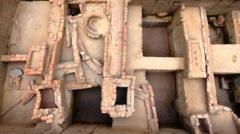Under a soccer field in the Simmering district of Vienna, an archaeological team stumbled upon a mass grave linked to the Roman Empire's battles with Germanic tribes. Discovered during renovations in October, the site contains the remains of at least 129 individuals, many of whom bear signs of battle injuries. The Vienna Museum's excavation team suggests this grave may be the result of a significant military defeat, leading Roman troops to abandon their fallen comrades.
Researchers utilized radiocarbon dating to pinpoint the bones to approximately A.D. 80 to 234, a significant period marked by the reign of various Roman emperors like Domitian and Trajan, who fought against Germanic peoples. Artifacts found alongside the remains, such as iron weaponry and pieces of armor, bolster the historical context of the find.
A rare aspect of this discovery is the presence of uncremated remains, which are uncommon in central Europe from this era, as the Romans primarily practiced cremation until later. Lead anthropologist Michaela Binder emphasizes the uniqueness of the find, stating it provides an invaluable opportunity to learn about the lives of individuals from the first century A.D. This unearthing beneath a sports field serves as a reminder of the deep historical roots in everyday places.




















